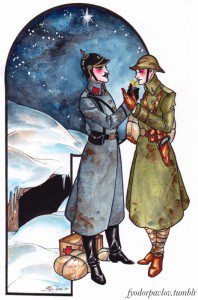 “Unitarians didn’t just inherit Christmas from the orthodox Christian sects,” Doug Muder tells us. “To a large extent we invented it, or reinvented it. For years the orthodox didn’t know what to do with Christmas. Easter was the big religious holiday. In England, Christmas looked more like Saturnalia than anything Christian. The actual caroling tradition was more like trick-or-treating than the way we picture it now. Rowdy mobs of the poor would stand outside the houses of the rich and intimidate them into offering food and drink. The Puritans hated the whole idea so much that the Massachusetts Bay Colony would fine you for celebrating Christmas.”
“Unitarians didn’t just inherit Christmas from the orthodox Christian sects,” Doug Muder tells us. “To a large extent we invented it, or reinvented it. For years the orthodox didn’t know what to do with Christmas. Easter was the big religious holiday. In England, Christmas looked more like Saturnalia than anything Christian. The actual caroling tradition was more like trick-or-treating than the way we picture it now. Rowdy mobs of the poor would stand outside the houses of the rich and intimidate them into offering food and drink. The Puritans hated the whole idea so much that the Massachusetts Bay Colony would fine you for celebrating Christmas.”
So, it wasn’t until the nineteenth century when Unitarians and Universalists defied the crumbling theocracy and brought Christmas to New England. And there was a reason we did this beyond the joy of sticking a thumb in the eye of authority. Unlike Easter, tied up as it is with stories of mythic events playing out on some cosmic scale that make very little sense when measured against our actual lives, Christmas is about a child being born and how that tiny, tiny event contains everything human beings need to know to find a way to hope and joy and possibility. The bells and whistles, the angels and wise men are window dressing. The story is the miracle of possibility in a single birth.
Many here are familiar with the Christmas peace of 1914. I would like to hold it up for your consideration one more time. The Great War as our grandparents or great grandparents called it was like too many wars, where from any distance at all it is hard to understand what justified the terror and carnage. It was a terrible thing this war. What we know with certainty is that Europe was divided in a terrible conflict and was awash in blood. Soldiers were in trenches that fronted on each other, and hundreds and more would die to take inches of ground. Over, and over again. Think hell on earth.
Then six months into the conflict there was that Christmas Eve. Into the cold and mud and fear and across the gulf of trenches and guns a young German soldier began singing Silent Night. Then, magically, the British responded in kind. And then the miracle; a young German soldier advanced under a white flag, bearing gifts, and right through Christmas day the conflicts stopped.
The generals did not appreciate this, and while there were attempts to claim this peace by the ordinary soldiers again, against the threat of execution they failed. But, people remembered that day, and I recall that day, and I think about it.
First, I notice that the people we most likely would identify with, the people on whose side our nation would enter that war not long after, did not sing the song first. And it wasn’t a young British soldier braving being shot carrying a peace flag. The Christmas peace came from the enemy. Peace came from an unexpected quarter. I think about that. It was not unlike hope, peace, joy, coming to us in the birth of a child, an ordinary child. It was very much right for this strange holiday.
When we tell the story here at First Unitarian in our annual Christmas pageant the Christ child is usually a baby born close enough to Christmas to be a small baby. But we don’t worry too much beyond that. This year the baby Jesus was a little girl. Once at another church I served the baby Jesus was twins. I remember when baby Jesus had two dads. I also recall that year when there were three families who had their babies within days of each other, and we decided, well, we have three aisles, and so we proceeded to tell the story with three holy families.
This season we notice is the season of ordinary hope. Ordinary. Just like a little girl baby Jesus. And in that noticing maybe we can miracles.
Out of this ordinariness brought to us by a child, brought to us by an enemy who refuses to fight brings with it a call to work, to the real work of our lives, to the work of Christmas.
Howard Thurman sings to us of this work of Christmas, of ordinary miracles:
When the song of the angels is stilled,
When the star in the sky is gone,
When the kings and the princes are home,
When the shepherds are back with their flocks,
The work of Christmas begins:
To find the lost,
To heal the broken,
To feed the hungry,
To release the prisoner,
To rebuild the nations,
To bring peace among brothers,
To make music in the heart.
May this work, the Christmas work, continue until all is healed, until the conflicts are all stilled, till we find the meaning hidden in that silent night.












